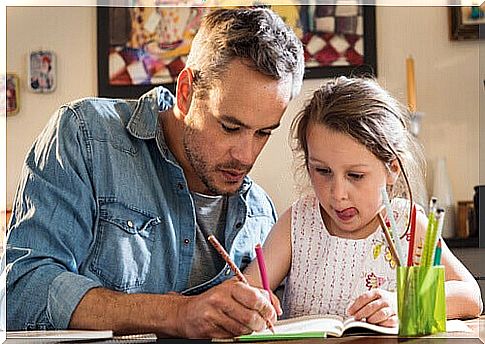Errors In Raising Children

It is often said that no one teaches to be a parent. This is true, especially since every child is different and the recipes are useless. However, knowing the most common mistakes in raising children helps us make fewer of them.
Sometimes it is precisely the fear of making mistakes that makes us make mistakes: the pressure of our social environment can be very strong. We therefore propose that you change your perspective: accept an intermediate position between doing everything right and not doing everything wrong. To do this, our mistakes must be identified and corrected.
5 mistakes in raising children
1. Expect them to become geniuses at school
The need to equip our children with the tools to face the future, and the hope that this will be wonderful, leads us to wish them to become geniuses, even if the price to pay can be very high. This desire prompts many parents to over-stimulate their children from an early age, crowding their activity days or proposing one goal after another.
Philosophers such as Epicurus, Heidegger or Byung-Chul have dedicated essays and analyzes to the consequences of the bad reputation that boredom has within our society. For some time, psychology and philosophy have emphasized the importance of boredom for the development of creativity and the ability to solve problems.

Wishing that the child is the top of the class pushes us to have little patience at the first difficulties or at the first school failures. They forget that education is a long-term process and that learning is all about trial and error, and a lot of patience. Furthermore, we forget that self-esteem plays a fundamental role in academic achievement.
Colin Rose and J. Nicholl report in their essay the data of a research according to which 82% of children starting elementary school are very confident in their ability to learn. This percentage, however, plummets to 18% at the age of 16 and still a little more at the time of entering university.
The risk is the loss of self-esteem and motivation
On the other hand, demanding too much from a child drastically affects their self-esteem. Not being able to meet the demands of parents – with the tendency to project this belief into adulthood – is at the root of many problems. The risk is to demotivate him. As the American philosopher Ralph Waldo Emerson said, “Nothing great has ever been achieved without enthusiasm.”
2. Making study the only focus is one of the mistakes in raising children
When we put study at the center of family life, we are giving our children a strong message. They may think we don’t care about their emotional life, their more personal dimension. One of the mistakes in raising children is to inquire only about what they did in school, what grades they got, what homework they have to do. Other contexts or their emotions seem not to matter.
Some parents go so far as not to ask for help at home or not to assign them any responsibility, meaning study as the only task. They focus on this aspect while neglecting all others, such as making friends, acquiring skills, becoming responsible, developing tastes or harboring dreams.
3. Reward and punish for a school grade
The reaction to school grades is a very important issue: reward when they are high, punish when they are low. The problem is twofold. On the one hand, we are leaving out the external and internal factors that affect concentration, performance or attention. On the other hand, if we continually provide a reward, the child’s motivation fails.
“The strongest stimulus comes from discovering new things and developing your own interests. If a material stimulus is needed, something is wrong ”. So says Joan Domènech, a teacher in Barcelona. Even Marx warned us against the dangers of materialism, the obsession with objects and the risk of turning children into little capitalists.
The best we can do is praise good results with phrases like “I am very proud of you” or “you must be very proud of your efforts and achievements”. When the grades are bad, however, try to analyze together what happened, in order to correct the mistake.
Maybe your kids can’t concentrate, don’t understand the topic, or they might need an extra boost, like a course of private lessons. In this case the message must be “how can I help you improve?”.
4. Study and do homework with the child
Many parents feel that they need to study and do their homework with their children. It is a habit that can have repercussions in present and future life. Depending on how we do it, we could be addictive. In the long run, she may have great difficulty coping with any school obligations without the help of her parents.
Also, incorrect help with homework can lead to conflicts and arguments. Parents, although they are the main educators, do not always have the best tools to support the child in all subjects.
Let them make mistakes and let the teachers correct them. Homework can be an excellent educational tool to stimulate autonomy. As Piaget says in his book Moral Judgment in the Child (1932), autonomy is the ability to govern and make decisions for oneself.

5. Failure to respect the school’s approach to errors in the education of children
Another aspect, no less important, is that we tend to continually criticize the approach adopted by the school. Too many tasks or too few, too much effort required… If we choose a school, we should accept its approach; when we criticize it, we send the child a mixed message.
It is true that in Italy, according to statistics, more hours a week of homework are done than the average in other countries of the world. But this depends on the school and the characteristics of the child, among other things. It is a fact to be accepted: in this way, we will set a good example for our children. From a certain age, we leave them the initiative to solve school difficulties.
There is no correct formula to help them with their homework, just guidelines. For example , a Canadian program called 24-Hour Movement recommends between 9 and 11 hours of sleep, at least one hour of homework per day, and fewer hours of leisure spent on displays.
The Canadian movement concludes “we have found that more than two hours of entertainment on screens are associated with worse cognitive development in children.” The hours of leisure should therefore be occupied by play, free and chosen by the child.
When it comes to studying, we should be flexible, patient, listen to our children and put ourselves in their shoes. So let’s not focus only on studies. Neglecting other aspects of their life means compromising the relationship, ceasing to be parents to become teachers or tutors for our children.
Education of the children, then?
Let them get bored, make mistakes, get some bad marks so that they can learn from their mistakes. In other words, let’s encourage them to be autonomous. This makes them strong and gives them a point of reference for the future. And this is the best education we can offer our children.









